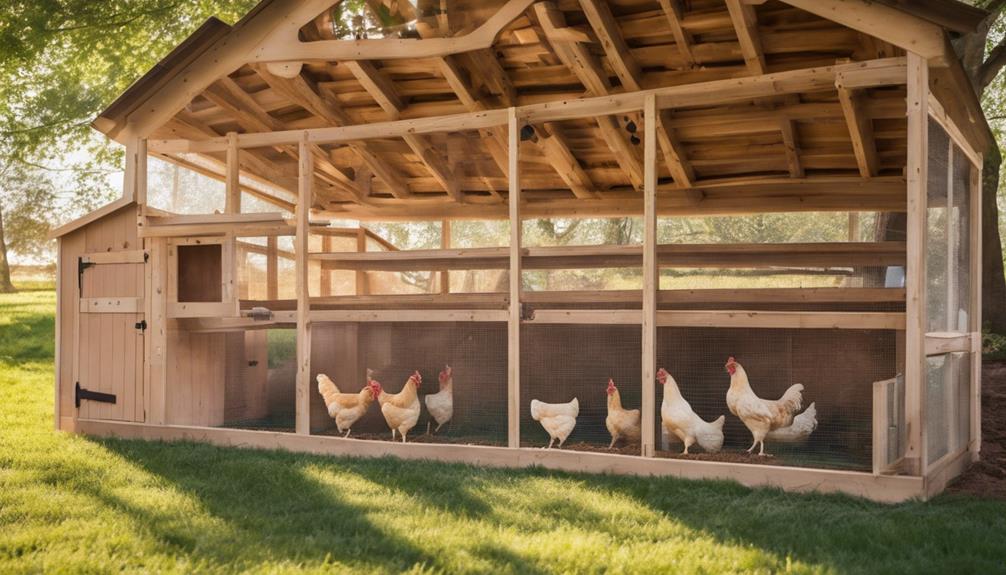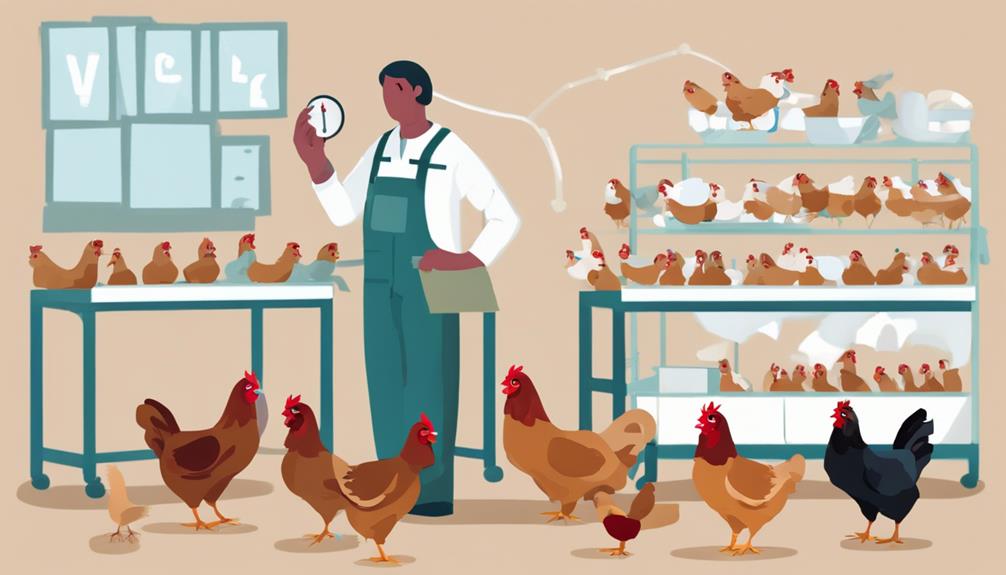10 Essential Steps to Launch Your Organic Chicken Farm"
Embark on your organic chicken farm journey by researching local regulations and acquiring necessary permits. Select suitable land with proper drainage for coop construction. Design a coop layout with efficient space use and ventilation. Carefully choose organic feed sources to meet nutritional needs. Source healthy chicks from reputable suppliers, providing essential care. Implement pasture rotation for grazing and soil health. Regularly monitor chicken health and maintain vaccinations. Market your organic products by staying informed on trends and connecting with consumers. These essential steps lay the foundation for a successful organic chicken farm venture, ensuring a sustainable and fulfilling experience.
Research Local Regulations
Before you begin setting up your organic chicken farm, ensure to thoroughly research the local regulations in your area to comply with all necessary requirements. Understanding zoning regulations is crucial to determine if your chosen location allows for agricultural activities like poultry farming. Check if you need specific permits to operate a chicken farm and make sure to obtain them to avoid any legal issues. Be aware of any restrictions related to the number of chickens you can keep or the infrastructure you can build on the farm. Engaging with the local community is also essential. Educate your neighbors about your organic farming practices to foster positive relationships and address any concerns they may have.
Compliance with regulations is key to the success of your organic chicken farm. Stay informed about any enforcement actions that may affect your operations and make adjustments as needed to remain in good standing. Embrace sustainability practices in your farming methods to minimize environmental impact and promote the well-being of your chickens. Advocate for policies that support organic farming within your community to create a supportive environment for your venture. By navigating local regulations effectively, you can establish a strong foundation for your organic chicken farm's success.
Choose Suitable Land
To establish a successful organic chicken farm, selecting land that meets specific criteria is crucial for optimal operations and the well-being of your chickens. Before purchasing land, conduct a thorough land assessment to ensure it meets the requirements for a chicken farm. Look for a location with good drainage to prevent waterlogging, as excessive moisture can lead to various health issues for the chickens. Additionally, assess the topography of the land to ensure it's suitable for constructing chicken coops and allows for easy access for feeding and cleaning.
Soil analysis is another essential aspect when choosing land for your organic chicken farm. Conduct soil tests to determine the soil's pH levels, nutrient content, and composition. Organic chickens require a healthy environment, so ensure the soil is free from contaminants such as heavy metals or pesticides. Opt for land with fertile soil that can support the growth of organic feed for your chickens, reducing the need for external sources of feed.
Consider the size of the land based on the scale of your operation. Ensure there's enough space for the chicken coops, outdoor areas for the chickens to roam and forage, and potential future expansions. Choosing suitable land with proper land assessment and soil analysis sets a strong foundation for a successful organic chicken farm.
Design Coop Layout
When designing the layout of your chicken coop, prioritize the efficient utilization of space to ensure the comfort and well-being of your organic chickens. Adequate coop ventilation is crucial for maintaining good air quality and regulating temperature. Place windows or vents strategically to allow for proper airflow without creating drafts that could harm your chickens. Consider using hardware cloth to cover openings to prevent predators from entering while still allowing air circulation.
The placement of roosting bars is also essential in your coop layout. Chickens naturally seek elevated spaces to roost at night, so providing sturdy and appropriately spaced roosting bars will help them feel secure. Place the roosts higher than the nesting boxes to discourage chickens from sleeping in the nesting area, which can lead to dirty eggs.
Additionally, ensure that your coop layout includes easy access for cleaning and egg collection. Design the coop with removable nest box lids or doors that allow you to reach all areas easily. Consider incorporating a droppings tray beneath the roosting bars for convenient waste removal.
Select Organic Feed Sources
Optimize the health and productivity of your organic chickens by carefully selecting high-quality organic feed sources that meet their nutritional requirements. Meeting the nutritional needs of your chickens is essential for their overall well-being and the quality of the organic products they'll provide. When choosing organic feed sources, consider the specific nutritional requirements of different stages of chicken growth, such as chicks, layers, or broilers. Quality assurance is paramount when selecting organic feed sources to ensure they're free from pesticides, GMOs, and other harmful additives that could compromise the organic integrity of your farm.
Organic feed sources should contain a balanced mix of proteins, carbohydrates, fats, vitamins, and minerals to support the growth, egg production, and overall health of your chickens. Look for organic feed suppliers that have certifications ensuring the quality and organic standards of their products. It's also beneficial to source feed locally whenever possible to support sustainable practices and reduce the carbon footprint of your farm.
Regularly monitor the health and performance of your chickens to assess if the chosen organic feed sources are meeting their nutritional requirements. Adjust the feed composition as needed based on feedback from a poultry nutritionist or veterinarian. By carefully selecting high-quality organic feed sources and ensuring they meet the nutritional needs of your chickens, you're laying a solid foundation for a successful organic chicken farm.
Source Healthy Chicks
Selecting healthy chicks is crucial for establishing a strong foundation for your organic chicken farm. When it comes to chick sourcing techniques and health standards, it's essential to choose reputable hatcheries or suppliers known for their commitment to producing healthy poultry stock. Look for suppliers that prioritize vaccinations, proper nutrition, and overall bird welfare.
Before bringing the chicks to your farm, ensure you have the necessary brooding essentials and equipment needs in place. This includes a brooder box or area that's warm, draft-free, and equipped with a heat source such as a heat lamp or heating pad. Additionally, provide fresh bedding, clean waterers, and chick feed formulated for their growth and development.
When sourcing your chicks, inspect them carefully. Healthy chicks should have bright eyes, clean vents, and smooth, well-groomed feathers. They should be active, alert, and free from any signs of illness or deformities. If possible, choose chicks that are sexed to ensure you're getting the specific gender you desire for your flock.
Implement Biosecurity Measures
Wondering how you can safeguard your organic chicken farm from potential disease outbreaks and external threats? Implementing biosecurity measures is crucial for disease prevention and maintaining the health of your flock.
Start by establishing strict hygiene practices to minimize the risk of disease transmission. Regularly clean and disinfect equipment, tools, and facilities to prevent the spread of pathogens. Additionally, ensure that all personnel working on the farm follow proper sanitation procedures, such as washing hands before and after handling the chickens.
Quarantine procedures are essential to prevent the introduction of diseases to your farm. When bringing in new birds, always quarantine them in a separate area for a period of time to monitor for any signs of illness. This helps prevent the spread of potential diseases to your existing flock.
Develop visitor protocols to control access to your farm. Require all visitors to wear protective clothing and footwear, and provide designated entry points to minimize the risk of contamination.
Provide Adequate Shelter

To ensure the health and well-being of your organic chicken flock, providing adequate shelter is paramount in protecting them from environmental stressors and predators. When it comes to shelter maintenance, regularly inspecting the coop for any signs of wear and tear is crucial. Repair any damaged areas promptly to keep your chickens safe from the elements and potential predators. Additionally, consider implementing proper ventilation considerations within the coop to ensure good air circulation and prevent the buildup of harmful gases.
Predation prevention is another vital aspect to consider when providing shelter for your chickens. To safeguard your flock, employ coop security strategies such as installing sturdy locks on doors and windows, using predator-proof fencing, and ensuring there are no gaps or weak points where predators could gain access. Regularly check for any signs of attempted breaches and reinforce security measures accordingly.
Practice Pasture Rotation
Inspecting and maintaining your chicken coop regularly is fundamental to their well-being; now, let's discuss the importance of practicing pasture rotation for optimal organic farming success. Grazing management is a key aspect of organic chicken farming. Rotational grazing involves dividing the pasture into sections and moving the chickens to a new section periodically. This practice offers several benefits such as preventing overgrazing, controlling parasites, and allowing the vegetation to recover.
When implementing pasture rotation, consider the size of your flock, the size of the pasture, and the growth rate of the vegetation. Moving the chickens regularly helps distribute their impact evenly, promoting healthier pastures and happier chickens. Additionally, rotating pastures reduces the build-up of pathogens and parasites in the soil, leading to healthier chickens overall.
Furthermore, pasture rotation plays a crucial role in soil fertility. By rotating the areas where chickens graze, you allow the soil to rest and regenerate. This process helps maintain soil structure, fertility, and microbial activity essential for sustainable farming practices. Healthy soil translates to nutritious pasture, which in turn enhances the quality of your organic chickens.
Monitor Health Regularly

Regular health monitoring of your chickens is essential to ensure their well-being and productivity on your organic farm. By staying proactive and observant, you can catch any potential issues early and take appropriate action.
Here are some key steps to help you effectively monitor the health of your chickens:
- Regular Health Checks: Conduct routine health checks on your chickens to look for any signs of illness, injury, or abnormalities. This can include observing their behavior, checking their feathers and skin, and monitoring their eating and drinking habits.
- Vaccination Schedule: Work with a vet to establish a vaccination schedule for your chickens to prevent common diseases. Vaccinations are crucial for disease prevention and overall flock health.
- Parasite Control: Implement a regular parasite control program to protect your chickens from external and internal parasites. This can involve using dewormers and pest control methods to keep your flock healthy.
- Nutritional Supplements: Ensure your chickens are receiving the necessary vitamins and minerals by providing them with high-quality feed and considering nutritional supplements. Proper nutrition is vital for the immune system and overall health of your chickens.
Market Organic Products
Keep a keen eye on the market trends and consumer demands to effectively position and promote your organic chicken products. Direct marketing plays a crucial role in reaching your target audience. Utilize social media platforms, local farmers' markets, and online platforms to directly connect with consumers interested in organic products. By engaging in direct marketing efforts, you can build relationships with customers, showcase the unique qualities of your organic chicken, and increase brand visibility.
Consumer education is key to successfully marketing your organic chicken products. Many consumers may not fully understand the benefits of organic farming practices or the differences between organic and conventionally raised poultry. Take the time to educate your target market about the advantages of choosing organic chicken, such as higher nutritional value, better animal welfare standards, and environmental sustainability. Provide informative content on your website, social media channels, and marketing materials to help consumers make informed purchasing decisions.
Incorporating consumer feedback into your marketing strategy can also enhance the appeal of your organic chicken products. Listen to customer preferences, address any concerns or questions they may have, and use their input to refine your marketing approach. By staying attuned to market trends, engaging in direct marketing efforts, and prioritizing consumer education, you can effectively market your organic chicken products and attract a loyal customer base.
Frequently Asked Questions
How Can I Protect My Organic Chickens From Predators?
To protect your organic chickens from predators, ensure your coop security is top-notch. Utilize hardware cloth to cover windows and ventilation openings, reinforce doors with sturdy locks, and install motion-activated lights or alarms.
Regularly inspect the perimeter for any potential entry points and consider using electric fencing as an added layer of protection. Predator prevention is key to keeping your chickens safe and sound on your farm.
What Are the Best Natural Remedies for Common Chicken Ailments?
To keep your chickens healthy, consider herbal remedies and preventative measures.
Herbal remedies like oregano, garlic, and apple cider vinegar can help boost their immune systems and ward off common ailments.
Preventative measures such as maintaining a clean coop, providing proper nutrition, and regular health checks can also ensure your chickens stay in top condition.
Is It Necessary to Vaccinate Organic Chickens?
When raising organic chickens, it's essential to consider vaccine effectiveness and organic farming practices. Vaccination can provide protection against diseases, but some organic farmers opt for alternative methods due to restrictions on certain vaccines.
Maintaining a clean environment, proper nutrition, and good hygiene practices can also help prevent illnesses in organic chickens. Ultimately, the decision to vaccinate should align with your organic farming principles and the specific needs of your flock.
How Do I Ensure My Organic Chickens Are Truly Free-Range?
To ensure your organic chickens are truly free-range, focus on pasture rotation and coop design. Allow them space to roam and forage, which aligns with their natural behavior.
Implementing a rotational grazing system can help maintain the health of your pasture and keep your chickens active and happy. By observing their foraging habits and understanding chicken behavior, you can create an environment that promotes their well-being and truly embodies free-range principles.
What Are the Key Factors in Pricing Organic Chicken Products?
When pricing organic chicken products, consider factors like:
- Organic certification, which ensures quality and compliance with standards, adding value to your products.
- Production costs, which play a significant role in determining the final price of organic chicken products.
- Consumer preferences for organic, free-range, and humanely-raised chickens, which can influence pricing strategies.
Understanding market demand and competition is crucial for setting competitive prices. By balancing these factors, you can establish pricing that reflects your farm's values and attracts eco-conscious consumers.
Conclusion
Now that you have completed the essential steps to launch your organic chicken farm, you're well on your way to a successful venture. By conducting thorough research, selecting the right land, providing a suitable coop layout, and ensuring the health and well-being of your chickens, you have set yourself up for success.
Remember to continue monitoring their health regularly and market your organic products effectively to maximize your farm's potential. Good luck on your organic chicken farming journey!
